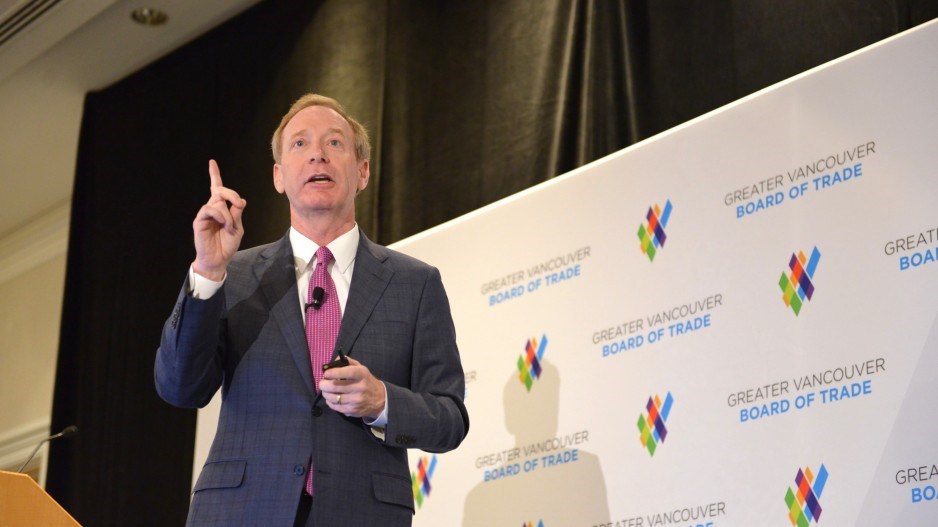Vancouver now has a “competitive advantage” when attracting global talent ahead of the Trump administration’s new travel ban targeting Muslim majority countries, says the president of Microsoft Corp. (Nasdaq: MSFT).
Brad Smith took a trip up the I-5 Wednesday (June 28) to address members of the Greater Vancouver Board of Trade, where he was promoting efforts to strengthen ties between the Vancouver and Seattle tech sectors.
Speaking to reporters following his speech, Smith said the travel ban due to go into effect Thursday (June 29) still leaves Microsoft with uncertainties over some international employees trying to attend events in the U.S.
“In the short run, the Supreme Court decision did narrow the impact, especially when it comes to the impact on business,” he said.
In contrast, he said Canada has made itself a “friendly destination” for global talent, citing Ottawa’s merit-based immigration policies and a “sense of stability” in the country’s immigration system.
“There’s great local talent here in Vancouver. And then there’s the opportunity to combine the great local talent with the great global talent,” he said.
“I think that is a competitive advantage.”
In June 2016, Microsoft opened a 142,000-square-foot, $100 million office above Pacific Centre.
It launched with 568 workers and Smith told the audience during his speech the number has since grown to nearly 650 in the past year.
But amid the yearlong hiring spree, Smith told reporters “housing is a factor” when trying to attract global talent.
“Vancouver is very attractive — and expensive,” he said, adding foreign workers who intend to live in Vancouver should never have to face a foreign buyer tax.
“The young people that we attract want to live in a healthy community and they recognize that a healthy community means a healthy diverse community. And that means a community that people of a variety of incomes can afford to live in.”
During his speech highlighting the merits of more integrated partnerships between the Vancouver and Seattle tech ecosystems — known as the Cascadia innovation corridor — Smith said both cities benefit from having an abundance of human capital but “we’re not in a great position when it comes to investment funding.”
Data he cited from BCG Analytics showed Seattle and Vancouver’s human capital ranking stood at No. 1 and No. 2, respectively, from a list of 10 tech ecosystems that included Toronto, San Francisco, Boston, Hamburg, Singapore, Melbourne, Amsterdam and Stockholm.
For investment and funding resources, Seattle ranked No. 4 and Vancouver ranked No. 9.
“We believe that the future of technology really is all about building stronger ecosystems,” he told the audience.
Smith said Vancouver’s strong background in the gaming industry gives it a unique opportunity to develop its own ecosystem by focusing big on augmented and mixed reality.
He pointed to Port Coquitlam’s Finger Food Studios as one of the leaders in this arena.
The local firm specializes in developing applications for Microsoft’s HoloLens headset.
Last year, it opened a Star Trek-like, 26,000-square-foot “Holodeck” facility that makes giant objects like semi-trailer trucks appear as life-size holograms in front of users’ eyes when they don the headset.
Technology like augmented/mixed reality, Smith said, has the ability to radically change how products are designed and built.
“Somebody said to me before the lunch began that it really wasn’t part of the Canadian character to have moxie,” he said after pointing to a 2016 forecast from Goldman Sachs that projects revenue in the augmented reality market to grow from US$6 billion this year to US$80 billion in 2025.
“Anytime you look at an escalator like that and you have the opportunity to get on it, it’s not a bad time to have a little moxie.”
-With a file from Glen Korstrom




